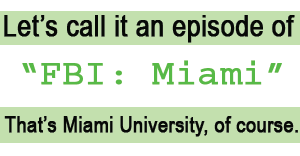


No tale of fiction here. Tara Smith ’92 made that journey from honors student at Miami to lawyer in Denver to FBI investigator in Chicago. A self-described true crime junkie who stayed up late in Stoddard Hall reading stories about serial killers, Tara now spends her days tracking cyber criminals through the FBI’s Innocent Images program.
The job places her in an elite group that had to meet rigorous standards before training at Quantico to become special agents. At the FBI’s Chicago Field Office, Tara shares this select status with five other Miami alumni: special agents Alyssa Doyle ’01, Eric Robinson ’91, Alan Bloniarz II ’91, Jenny Rettig ’85, and Matt Alcoke ’91.
Each made an occupational U-turn similar to Tara’s, abandoning more traditional jobs to work at what is arguably the premier investigative agency in the world.
“The caliber of people that the bureau recruits is just phenomenal to me,” says Alyssa, who has worked shoulder to shoulder with a former fighter pilot, business owner, and Green Beret. “I work with the best of the best.”
The Miami grads traveled many different roads before arriving in Chicago — the fourth largest FBI field office in the nation.
Alyssa, a management information systems major, developed pharmaceutical software for the Kroger Co. in Cincinnati. She now investigates public corruption in Chicago.
Eric studied religion, focusing on Islam. He was a minister for 11 years before joining the FBI, where he investigates Mexican and Columbian drug cartels. “I preached in church on Easter Sunday in 2002, and the next Sunday I was at Quantico,” he says.
Alan, an aeronautics major, wrote computer programs for many years to help engineers design tires at Goodyear. Today, he investigates gangs and violent crime.
Jenny studied accounting and worked as an auditor before her about-face. A bomb technician, she is on assignment in Afghanistan, sharing her expertise with the military.
Matt, a marketing major, was a department store sales manager and a street cop for the Cleveland Police Department before joining the FBI’s Violent Crimes Task Force and the Chicago SWAT Team.
 Although their résumés are wide-ranging, what they share is a desire to help others. Although their résumés are wide-ranging, what they share is a desire to help others.
Eric, a Toledo native, was active in Campus Crusade for Christ at Miami before becoming a minister. In time, he began looking for a career that would allow him to work on a team instead of independently. “When I was serving as a minister, I was hoping to do what is good for society, and I’m still trying to do the same.”
Alyssa was so moved by the terrorist attack on Sept. 11 that she decided to leave Kroger for the FBI. “I remember that day, sitting at my computer and thinking, ‘I’m an able body here. Given my background, what could I be doing?’ I wanted to go out there and try to help people.”
A special agent’s job offers opportunities to do just that, as Tara learned firsthand. When the planes hit the World Trade Center, she was on an international terrorism squad. She heard about the attack on her car radio while driving to the office.
“Everything was put on hold except for working on this case,” Tara says. Agents followed hundreds of leads, including interviewing people at airports and flight schools to see if they knew the hijackers.
Jenny also has been active in fighting terrorism, although she was hired at a time when accountants were being recruited to probe white-collar crime. After several years with the bureau, she trained in Alabama to be a bomb technician and was assigned to evaluate potential targets for terrorist activity as part of a Counter Terrorism Preparedness Squad.
Sound glamorous? Maybe, but the agents say their day-to-day jobs typically aren’t as glitzy as the plot lines on “CSI” or “Without a Trace.”
“Conducting an investigation requires persistent effort and can be tedious,” Alan says. “However, it’s all worth it when your hard work and long hours pay off at the end of an investigation, and you get to arrest the bad guys and get them off the streets.”
When it comes to details, fictional depictions of this real-life job aren’t always accurate, the agents say. For example, it takes hours — not minutes — to analyze a crime scene and process evidence. And there’s no place on television for the more mundane aspects of the job.
Eric investigates drug traffickers with links to cartels in other countries, focusing on those who distribute large amounts of narcotics. It’s dangerous business, no doubt, but not necessarily as fast paced as media portrayals. In real life, long hours spent on surveillance are punctuated by short bursts of action when it’s time to capture the crooks.
“Everything requires paperwork, which in turn requires a couple different signatures, which in turn requires a lot of time,” Alyssa says.
And, of course, in Hollywood “they’re able to solve every case in one hour,” Tara jokes.
However, prime-time TV often does display the techniques and technology used by real experts. For example, investigators do compare shell casings, match fiber and hair samples, evaluate blood spatter patterns, digitally scan fingerprints, and use alternate lighting to find body fluids.
In one of Tara’s cases, agents found five-year-old blood stains on flooring under an apartment carpet. Through DNA analysis, the bureau’s lab matched the blood to a victim’s bone found at a separate location. In another case, she lifted fingerprints of a potential suspect off the cadaver of a girl who was murdered and stuffed in a duffel bag.
The cases can be heartbreaking. Tara’s cyber squad investigates child exploitation on the Internet, including child pornography and sexual assault. Predators often snare children by promising friendship and attention, she says.
“They play on kids’ weaknesses, whether it’s lack of self-esteem or whatever it is,” Tara says. “The scary thing is some parents don’t even know how to turn a computer on.”
In one investigation, Tara was able to locate a stepfather who sexually abused his stepdaughter, placed pornographic images of her on the Internet, and offered her to other men. The gut-wrenching story had a gratifying ending: Authorities prosecuted and convicted not only the father, but also a man who had arranged to meet the girl.
At times, the agent’s role is to thwart a crime. Eric once investigated a heroin trafficker who was making plans for the gruesome torture of an adversary in a warehouse until the FBI stepped in.
Not every case is as disturbing, and some can be amusing.
Alan was involved in the case of the “bandaged bandit,” who committed 15 robberies around Chicago. The bandit, who wore bandages to cover up distinctive scars, was arrested when he entered a federal building with an FBI office.
The crook apparently stopped in to check the status of a lawsuit he had filed against a former employer for firing him without just cause. Ironically, he had been dismissed for missing work on one of the days he robbed a bank. Matt was one of the agents who apprehended him.
Reminiscent of the TV show “Numbers,” Alan had plotted each robbery on a map and used pattern analysis to calculate where the criminal might live. In the end, agents discovered the bandit lived a half mile from where the analysis predicted.
As predictions go, it’s doubtful that any of the six Miamians could have forecast they’d all be at the FBI today. Still, several say they learned important lessons in college that help them daily.
As a student, Matt was involved in Laws, Hall & Associates and Miami Marketing Enterprises and volunteered for the Oxford Fire Department. His extracurricular pursuits gave him “the ever-improving skill of multitasking.” He says his schoolwork and internships taught him to write concisely and to critically analyze material.
Tara says she learned about human anatomy while “playing with skeletons” in professor Linda Marchant’s anthropology class, where students handled skeletal bones to learn about evolution. Those skills have helped her to analyze bones as a member of the FBI Evidence Response Team.
Miami also provided the all-important four-year degree that is a minimum requirement for a special agent. That’s just one prerequisite in an application process that can take six months to two years, with many job-seekers weeded out along the way. Last year, only 2 percent of those who applied actually became special agents.
“It’s been a challenge on pretty much every single level, from the physical fitness standards they had for us at Quantico to the mental challenge — outsmarting those people out there who are trying to outsmart you,” Alyssa says.
As jobs go, few others compare.
“I have enjoyed coming to work almost every day of the last 11 years and have even looked forward to coming back to work after having days off,” Matt says of his years in law enforcement. “Everyone should be so lucky to find such a job.”
Lisa Cardillo Rose ’76 is a Cincinnati-based freelance writer who lives in Bethel, Ohio, with her husband, Mark Rose ’76. Photos by John Conroy/FBI.
 Back to the Miamian Magazine Fall 2006 Web page Back to the Miamian Magazine Fall 2006 Web page
|



 Although their résumés are wide-ranging, what they share is a desire to help others.
Although their résumés are wide-ranging, what they share is a desire to help others.